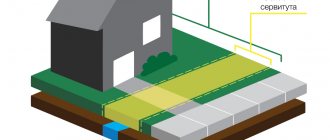A deed of gift for an apartment with an encumbrance has a number of legal nuances, which should be the subject of a separate article. The real estate gift agreement itself is the only gratuitous transaction that does not imply reciprocal obligations. This is one of the convenient and profitable ways to transfer ownership to relatives. A deed of gift for real estate is always in writing and requires mandatory state registration, and the transfer of rights can only be realized during the lifetime of both parties.
What you need to know about the deed of gift with encumbrance
An entire chapter of the Civil Code of the Russian Federation dated January 26, 1996 No. 14-FZ (Part II, Chapter 32, Art. 572-582) is devoted to the issue of donation. The peculiarities of concluding a gift agreement with an encumbrance follow from the articles of the Civil Code of the Russian Federation corresponding to a certain type of restrictions.
To draw up a gift deed with an encumbrance, you will need to collect a package of documents:
- Passports or identity documents of the parties to the transaction:
- If the donee is a minor (under 14 years old) - a birth certificate and documents confirming legal representation.
- If the gift is given to a minor (14-18 years old), his passport and written permission from the parents for the teenager to participate in the transaction.
- If the donee is an incapacitated person, the permission of the guardian or guardianship authority.
- Title documents for the object of donation.
- Consent of the spouse or other owners of the object to the donation, confirmed by a notary.
- Extract from the house register.
- Cadastral passport and documents from the BTI: extract, floor plan.
- Information about the market value of the apartment.
- Application for registration of transfer of ownership rights to a specific object.
- Receipt for payment of the state duty for state registration of the transfer of ownership of real estate. The state duty for individuals is 2,000 rubles (clause 22, article 333.33, chapter 25.3, part II of the Tax Code of the Russian Federation).
- An extract from the Unified State Register of Legal Entities for a transaction with a commercial organization.
When drawing up a deed of gift for a real estate with an encumbrance, it is advisable to obtain legal advice in order to eliminate the risks of invalidation of the agreement if third parties may have claims against the recipient of the gift.
A more reliable way to guarantee the validity of a contract is to get it notarized. The amount of payment for notary services depends on the value of the object and the degree of relationship between the donor and the donee:
- if the parties to the contract are closely related, the payment will be: 3,000 rubles + 0.2% of the contract amount up to 10 million rubles;
- 23,000 rubles + 0.1% of the contract amount over 10 million rubles, but not more than 50 thousand rubles;
- 3000 rubles + 0.4% of the contract amount up to 1 million rubles;
The prices were approved by the Law on Notaries of February 11, 1993 No. 4462-1 (Article 22.1 Chapter 5, Section I).
According to tax legislation, if the donee is a citizen of the Russian Federation and is closely related to the donor, he is exempt from tax. The remaining categories of individuals must pay standard personal income tax: 13% for residents of the Russian Federation and 30% for non-residents.
Personal income tax is calculated from the average market value of the gift or from the amount specified in the contract, provided that its deviation from the average market price does not exceed 20%.
Differences
Regarding rent, the situation is as follows. The annuitant transfers property to the other party. In exchange for this, the annuitant agrees to pay a certain amount of money periodically. Or contain the annuity recipient in another form. An annuity can be either lifelong or permanent.
The subjects of two contracts (donation, rent) can be any property: movable, immovable. But provided that it is not limited in circulation (Article 129 of the Civil Code of the Russian Federation).
An apartment that is alienated for rent can be transferred for a fee or free of charge. In the first situation, in case of expropriation for compensation, the apartment is given not only in exchange for rent payments and housing and communal services. The rules governing purchase and sale apply to such relationships. In donation, property is transferred only free of charge. This is a sign that characterizes a gift agreement.
Rent is a contract that must be notarized. There are no such requirements for donation.
If we talk about how a donation with a physical encumbrance differs from an annuity with a lifelong residence, then significant differences emerge between the two agreements:
1) The donation contains a condition - the donor is registered and lives in the apartment that is being transferred. The donee accepts the apartment with an encumbrance, but free of charge. It is very important. According to the rent, the former owner remains to live in the apartment, and the one who supports him is obliged to do this until the death of the citizen. The content may be in monetary or other form.
2) The rent, however, is considered an encumbrance. The rent payer, if he sells the property, transfers the right to pay it. And it also bears joint and several liability for financial payments along with the new owner in the event that he is not solvent. Thus, you can see the main difference between annuity and gift. This is the latter's gratuitousness.
3) The rent payer can sell the property only with the consent of its recipient. The latter acts as the mortgagee of the residential premises. In a donation, the owner has the right to decide how to dispose of the property; the consent of the previous owner is not required.
4) Taxation. Gifts are taxable. Its rate is 13 %. The law establishes a tax on income that was received in the form of a transferred apartment. But there is an exception that eliminates the obligation to pay the state fee. This is the conclusion of a gift agreement between people who are related by blood. Their circle is defined in Art. 14 of the RF IC, as well as in the LC and the RF Civil Code. But the latest laws are not about relatives, but about family members. Therefore, it is more correct to refer to the norm of the RF IC.
The rent is not taxed in any case. In addition, its payer has the right to claim a property deduction. It is provided at the place of his residence by the Tax Inspectorate. The existence of rent is confirmed by the contract of the same name.
Understand that the annuitant pays the taxes associated with the transfer of ownership. In addition, he pays for the income he receives in the form of rental payments under the contract. Tax rate – 13%.
5) An apartment transferred during marriage as a gift to one of the spouses remains the personal property of the husband or wife. It all depends on who the property was transferred to. And for rent, if the spouses decide to divorce, after registering ownership of the apartment, they divide the property. According to the law, it is equivalent to joint property. Art. talks about this. 34. 36 RF IC.
In case of any encumbrances imposed on residential premises, it is in the interests of the owner to remove them. If this happened due to debts, try to pay them off; when renting, wait until the end of the contract or terminate it unilaterally. In any of these situations, lifting restrictions on the apartment will speed up the process of registering the transfer of ownership by gift in Rosreestr.
Share this article:
Donation of an apartment with an encumbrance from the point of view of the law
The law provides the owner of a residential premises with the right to dispose of real estate at his own discretion (Article 572 of the Civil Code of the Russian Federation), therefore, even if there is an encumbrance, the owner has the right to donate housing.
The law prohibits such transactions if:
- They are conducted on behalf of the legal representative of the minor or incapacitated owner.
- The recipient is an employee of an educational, medical, social institution, and the donor is a citizen who used their services, a relative or spouse.
- The gift is intended for an official or employee of the Bank of Russia and is related to their professional activities.
- They are concluded between two commercial organizations.
In other cases, the question of whether it is possible to donate an apartment with an encumbrance does not arise.
The procedure for registering a deed of gift with an encumbrance consists of several stages:
- obtaining written permission from the bank to complete a transaction to donate an object;
- drawing up a gift agreement with an encumbrance;
- checking the authenticity of documents and the accuracy of the information contained in them;
- certification of the contract by a notary;
- registration of transfer of ownership.
Depending on the type of encumbrance, the deed of gift will have its own characteristics.
We draw up a deed of gift: when the encumbrance is not a hindrance
A deed of gift allows the owner of a property with an encumbrance to transfer it into ownership to the donee, but with restrictions on his rights.
When agreeing to take ownership of real estate with an encumbrance, you need to weigh the risks, since the donee will be forced to comply with the imposed prohibitions, experiencing certain difficulties, or will be left without a gift altogether if the agreement is declared invalid.
Arbitrage practice
The modern Russian legal system is imperfect. Not all aspects related to obtaining encumbered real estate are covered in legislative acts. Judicial practice demonstrates that such agreements are recognized as legal in most cases.
In such situations, judges are guided by Art. 308 of the Civil Code of the Russian Federation, in which the encumbrance in the form of lifelong residence is interpreted as corresponding to the letter of the law.
The problem with court decisions is that the liability of the parties to a lifelong gift agreement is poorly regulated. You have to rely only on the agreement concluded between the parties. However, its points may come into some conflict with existing legal norms.
The main problem with which citizens go to court is the right to live in an apartment donated by the donor, if it was transferred to another person as a result of a transaction by the donee. In this situation, the court always acts on the side of the citizen who was the original owner of the apartment, determining the possibility of his further residence in the apartment until his death. That is, it will not be possible to remove such a burden without the consent of all parties.
Concluding a contract with the right of lifelong residence is not a rare transaction, usually involving people who are closely related. They also resort to it in order to avoid paying income taxes. But before entering into an agreement, all parties should carefully weigh the pros and cons, especially if there is a possibility that the new owner will sell the apartment.
The rules for drawing up an apartment donation agreement will be discussed in the video:
Donation of mortgage housing
Transactions with mortgage real estate are common because they are the most realistic way to purchase an apartment. In the future, the owner of such housing will be able to dispose of it at his own discretion, including as a gift, although legally the owner of the apartment is the credit institution.
All cases of alienation of mortgaged property are under the control of the bank and are possible only with its permission (Article 37, Chapter VI of the Federal Law “On Mortgage” dated July 16, 1998 No. 102-FZ). From the bank’s position, a change of owner represents an additional undesirable risk, therefore such transactions are unattractive for a financial institution, and it has the right to refuse.
There is a greater chance that the bank will at least consider the transaction option for those who, at the stage of obtaining a loan, included in the contract a clause on the right to alienate the apartment in favor of third parties.
When considering donating housing with collateral, the bank carefully assesses its own risks and analyzes the financial condition of the future owner:
- motive for giving: loss of job, illness, moving to another city, etc.;
- the desire of a third party to accept the burden of repaying the loan;
- ability to repay the loan: level and stability of income, balance after making the next payment;
- presence of dependents.
This issue is most often resolved by re-issuing a pledge to another similar object owned by the borrower, or a pledge obligation to the donee.
The listed options for concluding a transaction require the consent of the bank. If it was not possible to obtain it, the donor can draw up a deed of gift with a subsequent obligation to donate it as a gift after repaying the loan, that is, when the property ceases to be the subject of collateral.
What is an encumbrance?
If we talk about encumbrance, we must first remember the legislative acts. They regulate this process as some limitation of possible actions regarding future property. This is precisely what does not allow the complete disposal of property, including during transactions involving donations.
Among the most common encumbrance options are the following:
- A pledge that will regulate as a method of obligation. This also includes mortgage situations.
- An arrest that is considered only through a court hearing.
- An easement that allows the use of land, but only in a limited manner.
All specified species must be officially registered in Rosreestr, and information is submitted to the Unified State Register of Real Estate. Typically, these data are established at the moment when the text of the deed of gift is prepared. This procedure is carried out by requesting a particular document.
The legislative framework also provides for hidden options for encumbrances. This could be due to a lease or a conditional rent situation. This type of contract provides for the possibility of use only for a certain period of time.
IMPORTANT !!! If the owners include minor children, then this is considered a direct encumbrance. At the same time, the process is carried out only when it is allowed by the guardianship authorities. You can sell your home, but you can’t give it away.
If you want to carry out the procedure quickly, efficiently, and without any additional nuances, then it is best to remove any restrictions on the relative.
To do this you need to do the following:
- You must compensate any liability before proceeding with the procedure.
- You must resolve all court requirements.
If you have made the choice to carry out the donation procedure with existing encumbrances, then you need to study some additional nuances related to ensuring the interests of the person in whose favor there is a prohibition.
Donation of an apartment with the right of lifelong residence
One of the dangerous moments for the donor is the transfer of ownership of the apartment to the donee. If this is the donor’s only home, he may lose it. This can be avoided by donating an apartment with the encumbrance of lifelong residence. This version of the transaction will become a kind of way to protect the rights of the donor.
If the agreement is drawn up correctly, the rights of the donor and other conditions that do not violate the principle of gratuitousness are spelled out in advance, then it is recognized as legal.
For the donor, a deed of gift with the encumbrance of lifelong residence has obvious advantages, because it allows:
- own and live in a donated apartment for life;
- save registration (registration);
- use utilities for free;
- appeal the transaction and terminate the contract if the recipient violates the terms of the contract.
In order for the donor to acquire the above rights, these conditions must be recorded in the contract down to the smallest detail. In particular, it is worth stipulating what area and premises he has the right to use, mentioning the possibility of third parties living in the apartment, listing the recipient’s obligations for repairing communications, and so on.
The right to live in a donated apartment does not guarantee the donor care and financial support. In addition, the new owner becomes the owner of the apartment and has full right to dispose of it at his own discretion: sell or rent.
However, he will have to take into account the donor’s right to live in the apartment, which he will not lose even if the property is transferred to a third party.
Types of encumbrances
The requirements of the donor or third parties may vary. Each type of encumbrance entails certain consequences for both the donor and the donee. When starting to conclude an agreement, the parties need to be especially careful when completing the transaction.
The main types of encumbrances are as follows:
- Guardianship – is issued if the owner of the property is a child or an incapacitated citizen.
- Trust management. This type of restriction most often occurs when an apartment is donated to an incapacitated person. The trust may be a requirement of the board of trustees to arrange an additional transaction in relation to real estate. In this case, the guardian can dispose of the part of the property that remains under his control, and the administrator can dispose of the entrusted real estate. Moreover, both persons are obliged to take care of the encumbered housing and help extend its service life. The encumbrance in the form of trust management is issued for a maximum period of five years, but can be extended.
- Pledge. To reduce the risk of loss of property, the donor may wish to remain the mortgagee of the property. This encumbrance implies the obligation of the owner in the future to decide the fate of the property together with the donor.
- Donation of an apartment encumbered by a mortgage is carried out only with the permission of the mortgage bank. A financial institution has the right to check the solvency of the beneficiary to be sure of full repayment of the debt. After concluding an agreement, permission to conduct a property transaction must be asked from the bank. When executing an agreement with a mortgage loan, you can leave the donor as the mortgage payer, but at the same time stipulate the terms of the rent between the parties. This type of encumbrance can be avoided by paying the bank in full as agreed between the parties to the gift transaction.
- An easement is the granting of the right of use to other persons. Often concerns a site and the possibility of passage through it.
- Deed of gift for an apartment with an encumbrance in the form of arrest. This type presupposes the existence of certain sanctions in relation to the donor and his property. Sometimes they become known even after the transfer of property to the beneficiary. In any case, the donor must warn the new owner about this type of encumbrance.
- A donation with an encumbrance in the form of providing the donor with the opportunity to live in the apartment. In this case, the encumbered area and permission to use the kitchen, bathroom, corridor and other premises in the apartment are specified. The transaction is free of charge and does not require additional investments from the parties.
- Rent. Under the terms of the agreement, the donor is the recipient of certain funds for life. Typically, this encumbrance is formalized in the form of a separate agreement, which stipulates the conditions of the donor's maintenance and the method of payment of the rent. A life agreement also provides the donor with the opportunity to participate in transactions with the property, as he becomes the mortgagee of the home. The new and old owners are jointly and severally liable. After the death of the previous owner, the donee becomes the rightful owner of the property. Another distinctive feature of this agreement is the tax exemption of the donee. The gift agreement with lifelong maintenance is certified by a notary.
- Rent. If the donor rents out an apartment and wishes to donate it, all rights in relation to the property are transferred to the new owner. Since tenants can be evicted at the end of the tenancy agreement, the new owner will likely have to wait until the tenants move out.
- The presence of other registered persons in the apartment is also a burden. These citizens may not live at the registration address, but the new owner should be aware of them.
- A donation is a special type of gift agreement. It provides for the mandatory intended use of the gift. The terms and form of the donee’s reporting to the donor are discussed, as well as the possibility of returning the property.
Encumbrance can come in various forms. In any case, the conditions regarding it are prescribed in the gift agreement and are an integral part of it. Violation of the provisions of the transaction may become grounds for going to court.
Dependent support
If the homeowner needs care and support, he can enter into a rental agreement. In this case, he transfers ownership of the property to another person, for which he receives a certain amount of money or maintenance in another form. Such a contract is not a deed of gift, because it does not meet the main condition - gratuitousness.
Another difference between a rent agreement and a deed of gift with the right of lifelong maintenance is that the rent payer does not have the right to immediately dispose of the housing, since the apartment becomes his property only after the death of the rent recipient. Before this event, any legal transactions with the property without the consent of the owner are prohibited.
A possible option for evicting the owner is alternative living space.
Since the annuity agreement is concluded on a reimbursable basis, disputes and dissatisfaction often arise between the parties, caused by unfulfilled expectations on the part of the annuity recipient, and unfounded claims or demands on the part of the payer.
To avoid disputes, the cost of the apartment, a detailed list of services and responsibilities, indicating their monthly cost, should be clearly stated.
There are differences between these two types of transactions in taxation: the recipient of a gift under a gift agreement is required to pay 13% personal income tax, and an annuity agreement does not require payment of personal income tax.
As for notarization and state registration, these conditions are necessary only for the rental agreement. The deed of gift does not have to be signed in the presence of a notary.
Another important difference between contracts is the form of ownership. When a gift is made, the property becomes the personal property of the donee, and the property received as a result of an annuity agreement is considered joint property.
Ordinary and conditional donation
A specific type of gift is a donation. A patron transfers a thing or property free of charge to a third party for use for socially beneficial purposes. The requirement for intended use introduces a conditionality factor into the gift transaction.
Donations are usually made to charitable organizations, medical institutions, research and cultural centers (Article 582 of the Civil Code of the Russian Federation).
Attention
Misuse of a donation gives the patron and his successors grounds to claim the donation from an unscrupulous user.
The legal entity that accepted the donation is obliged to keep records of activities related to its use.
Donation of seized housing
Debt obligations of the homeowner to utility services, banks, and the tax office can lead to the imposition of an encumbrance in the form of seizure of the property. Seizure is imposed only by a court decision and significantly limits the owner’s rights to housing, so it will not be possible to donate an apartment under arrest, at least until the encumbrance is lifted.
Lifting of the arrest also occurs as a result of judicial proceedings in the case of voluntary early execution of the subject of the claim. Sometimes the court may seize an object of similar value and characteristics.
Deed of gift with encumbrance - procedure for registration
An encumbrance is a certain condition under which the owner of the property cannot fully dispose of the property. Most often, an encumbrance is imposed on the rights to residential premises through the conclusion of another transaction. There are several possible restrictions:
- Mortgage. This is one of the forms of transactions secured by real estate. If the debtor fails to fulfill its obligations, the creditor has the right to alienate the property to pay off the debt. According to the law, the owner cannot carry out a number of operations until he repays the entire loan amount.
- Rent. Under a lease agreement, the owner transfers property to the tenant for temporary use for a specific period for a rent.
- Rent. Under an annuity contract, property will be transferred to the ownership of another person at a future date, subject to certain obligations.
- Arrest. A compulsory procedure for paying off debts based on a ban on the full use of property.
- Trust management. A transaction in which a person is transferred a certain amount of rights to real estate.
In addition to the above encumbrances, two more restrictions on property rights are possible. The first is if the interests of a minor citizen are involved in the transaction, the second is if the object of the donation relates to cultural heritage.
The process of registering a deed of gift with an encumbrance
The conclusion of a gift agreement occurs in stages. The algorithm will be as follows:
- Drawing up a deed of gift with an encumbrance.
- Notarization of the transaction.
- Verification of the authenticity and correctness of the documents on the basis of which the transaction is concluded.
- Registration of transfer of rights in Rosreestr or MFC.
- Obtaining an extract from the Unified State Register of Real Estate.
The entire registration process will take about three weeks. The greatest amount of time will be spent collecting documents and registering the transaction with a notary.
Registration of rights in Rosreestr occurs within 3-5 days.
Documents for donation with encumbrance
The list of required documents includes:
- civil passports of the parties (originals and copies);
- deed of gift in three copies (one for each party to the transaction and one for Rosreestr);
- data on the market value of the property;
- an extract from the house register about persons registered in the living space;
- cadastral passport of the object;
- certificate of ownership or extract from the Unified State Register of Real Estate;
- document providing the basis for the emergence of ownership rights (sale and purchase agreement, certificate of inheritance, court decision, etc.);
- consent of co-owners (if the object of donation is shared ownership);
- consent of the spouse if the property was acquired during marriage and is jointly acquired;
- receipt of payment of the state duty for registration of property rights (2000 rubles).
All listed documents are submitted to Rosreestr or MFC. Registration of rights re-registration through the MFC will take longer. To save time, you can make an appointment in advance at the institution by phone or on the official website of Rosreestr.
Contents of a gift agreement with an encumbrance
A deed of gift with limited rights is drawn up as follows:
- The title of the document specifies the type of encumbrance.
- The header is positioned across the entire width at the top of the agreement. Here the personal data of the parties is written down, indicating the actual place of residence, as well as the date of registration.
- The exact details of the donated item are recorded, indicating the cadastral number, address and other characteristics.
- The type of encumbrance and details of interested parties are indicated.
- Restrictions on property rights are prescribed.
- The rights and obligations of the parties to the agreement are listed.
- Measures to be taken in case of violation of the terms of the agreement and the procedure for resolving controversial situations are indicated.
- At the end of the content, information about the procedure for registering and certifying the transaction, as well as details and personal signatures of the parties, are written down.
A deed of gift with limited rights may be invalidated if it was drawn up incorrectly or in violation of the registration procedure. To avoid such a situation, it is recommended to seek help from a professional lawyer.
You can consult a lawyer about the drafting and content of an agreement on our website.
Donation agreement with encumbrance: content and structure
On the one hand, a deed of gift with an encumbrance fits within the framework of an ordinary civil law transaction, but on the other hand, each case is too unique to fit into the framework of a standard agreement.
Depending on the restrictions, a specific sample gift agreement will be required, but the general structure is standard:
- title of the document indicating the type of encumbrance;
- place and date of signing the agreement;
- a header indicating the parties to the agreement: full name, year of birth, full address of residence, passport details;
- data on the subject of the donation with a full description of the object: address, number, floor, number of apartments, cadastral number, cost, certificate from the BTI and other information identifying the object;
- information about property rights and state registration (data from supporting documents);
- the cost of the apartment accepted by the parties;
- presence and type of encumbrances, data of interested parties, restrictions on property rights;
- rights and obligations of the parties;
- conditions for transfer of ownership rights;
- procedure for resolving disputes and other conditions;
- procedure for registration and certification of a transaction;
- personal signatures of the parties.
Sample donation agreement:
Download (DOC, 47KB)
The main difficulty when concluding a gift agreement with an encumbrance lies precisely in the restrictive conditions that can significantly worsen the rights of the new owner. These conditions should be described in detail in the contract.
It is better if the document is drawn up with the assistance of a lawyer or notary, who will check the text for legal literacy and give recommendations and comments.
Certification of the contract by a notary is not a mandatory condition, but registration of rights in Rosreestr at the location of the subject of the transaction in the presence of both parties is mandatory.
The deed of gift is drawn up in at least three copies: for each of the parties and for Rosreestr. In case of notarization, another copy remains with the notary.
Lease encumbrance
In the case where the donor wants to transfer under a contract an apartment in which unauthorized persons live on a lease basis, a donation agreement with a rental encumbrance will be required. But this lease will not affect the property rights of the recipient in any way. The only limitation is that the new owner will be able to move into the apartment only after the lease agreement with other persons has ended. Both parties to the gift agreement can discuss additional subtleties with a notary to increase the security of the transaction.
Donating an apartment with an encumbrance is a rather complex procedure that requires a certain legal knowledge. But the help of a good lawyer will make it possible to resolve the issue of transferring real estate as efficiently as possible.
The essence of the deed of gift
There are different types of deeds of gift; under certain conditions, any of them can be applied to real estate with encumbrances. A deed of gift is a bilateral agreement that concerns the transfer of ownership from one person to another of certain property free of charge and without any conditions. This is the only type of transaction of this kind.
A deed of gift can be formalized in two ways:
- On your own. The one who draws up the contract takes responsibility for its compliance with the law. At the same time, the rights of your opponent should not be infringed.
- With the help of a notary. This option is simpler, since you don’t need to think about the content; everything will be legally provided by a lawyer according to the rules. Of course, you will have to pay for his services.
In any case, the use of a notary's services will be required if a share in the ownership of real estate is donated. As for determining the type of deed of gift for an apartment with encumbrances, some nuances should be taken into account, including the type of encumbrance. Available options:
- Standard form. It contains data regarding the parties, the item, and describes the fact of the donation. The owner assigns his rights upon completion of the transaction.
- Promise of giving. Often this option is applicable specifically for apartments with encumbrances. For example, in such an agreement it is stated that the property will pass into the possession of the donee only after the donor pays off the mortgage or after the arrest is lifted, etc.
- Gift deed during the life of the donor. Such an agreement can only be drawn up when the owner of the apartment is alive. Moreover, the agreement states that if the donee has not taken ownership until the death of the donor, the agreement is canceled.
- To a third party. The transaction may include data regarding the transfer. That is, the primary agreement may immediately indicate a clause on the possibility of transfer in favor of a third party.
- With an inventory. This option is practiced if the apartment itself contains valuable contents.
- In favor of two persons - if the apartment is given to a married couple or children. Moreover, both persons have equal rights to it, that is, each of them has an equal share in the real estate.
- Between relatives. This aspect affects tax. If the relationship is proven when drawing up the contract (documents are needed), then you will not have to pay 13% to the state.
- Privatized real estate or maternity capital. The first fact must be indicated in the deed of gift. As for maternity capital, if it was used to purchase real estate, then such a transaction must be checked by the guardianship authorities. The main goal is to make sure that the rights of the child are not violated.
Possible risks and consequences
The most important risk is that such a transaction will be considered void . Moreover, any person interested in the case can file a claim.
It is enough for him to involve an experienced lawyer and provide evidence that in fact this is not a donation, but a non-gratuitous transfer . And it won’t be difficult to prove this in case of encumbrance, even with a not very experienced lawyer (Article 166 of the Civil Code of the Russian Federation)
For example, in the case of arrest , this is most likely, because there is a discrepancy in the interpretation of the legislation.
On the one hand, arrest does not deprive the owner of his rights.
On the other hand, transactions with seized square meters are prohibited.
There is little hope for a positive outcome - if this is the only housing . The best thing you can do with real estate seized, for example, for debts, is to repay the debt and then make transactions with it.
mortgages is also ambiguous . To make such a gift, the consent of the bank is required. The only point where you can do without the permission of the creditor is the registration of your children and close relatives (Article 20 of the Civil Code of the Russian Federation).
However, if the agreement states otherwise, it is better not to download the rights, but still apply for permission from the bank management.
To be fair, it must be said that financial organizations do not always agree to such transactions. Changing the creditor is a risk for the bank itself.
As for guardianship , it may very well be that the interests of partially capable or incapacitated people are involved in the transaction. In this case, it is necessary to obtain permission for this procedure from the guardianship and trusteeship authority.
To do this, you need to submit a special application and provide documents for the property. The owner is faced with the task of convincing the guardianship authority that the defenseless ward will not be deceived or even thrown out onto the street.
with a life annuity is easier , but not much. Will the relationship between the former and new owners remain cloudless? And the previous owner will have to endure it, perhaps, for the rest of his life. It is possible that he will even outlive the one whom he made happy with such a gift.
Moreover, no one is canceling taxes. If a gift is intended for a close relative (parents, children, brother, sister, grandparents, spouse), then you don’t have to worry about this.
If the relationship is more distant or it is a stranger, he will have to share 13 percent of the cost of housing with the state.
You can find out about the procedure for donating an apartment to a close relative, in particular how best to draw up a deed of gift, and what documents will be required to complete the transaction on our website. A sample agreement for donating an apartment to a close relative can be downloaded here.
Deed of gift with encumbrance: pros and cons
Before a transaction to purchase complex real estate as a gift, you need to evaluate the pros and cons of such a transaction, taking into account all the subtleties. A great and undeniable advantage of a deed of gift with an encumbrance is the preservation or acquisition by the recipient of the opportunity to live in an apartment. Based on the gift agreement, the recipient can register other persons in the residential premises.
IMPORTANT! The condition of residence, as well as the lifelong term of the right to use the donated living space, must be indicated in the contract.
In most cases, for the recipient of distressed real estate, the listing of the advantages of such a transaction ends here. The disadvantages of the donee include freeing the owner from various problems and retaining his right to use the object, which is undoubtedly a plus for the donor. This option is suitable for people who do not have the opportunity to purchase real estate in any other way and are confident in their legal and financial strength to solve possible problems. When making such transactions, many simply do not know how to remove the encumbrance from the apartment.








